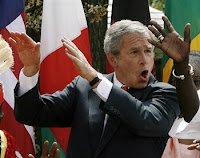 In its enitrety, here is an essay by Bob Herbert that sums up the complete and total disaster of the Bush Administration and the damage it has done to the United States.Add Up the DamageBy Bob Herbert, Op-Ed Columnist, The New York Times, December 30, 2008
In its enitrety, here is an essay by Bob Herbert that sums up the complete and total disaster of the Bush Administration and the damage it has done to the United States.Add Up the DamageBy Bob Herbert, Op-Ed Columnist, The New York Times, December 30, 2008Does anyone know where George W. Bush is?
You don’t hear much from him anymore. The last image most of us remember is of the president ducking a pair of size 10s that were hurled at him in Baghdad.
We’re still at war in Iraq and Afghanistan. Israel is thrashing the Palestinians in Gaza. And the U.S. economy is about as vibrant as the 0-16 Detroit Lions.
But hardly a peep have we heard from George, the 43rd.
When Mr. Bush officially takes his leave in three weeks (in reality, he checked out long ago), most Americans will be content to sigh good riddance. I disagree. I don’t think he should be allowed to slip quietly out of town. There should be a great hue and cry — a loud, collective angry howl, demonstrations with signs and bullhorns and fiery speeches — over the damage he’s done to this country.
This is the man who gave us the war in Iraq and Guantánamo and torture and rendition; who turned the Clinton economy and the budget surplus into fool’s gold; who dithered while New Orleans drowned; who trampled our civil liberties at home and ruined our reputation abroad; who let Dick Cheney run hog wild and thought Brownie was doing a heckuva job.
The Bush administration specialized in deceit. How else could you get the public (and a feckless Congress) to go along with an invasion of Iraq as an absolutely essential response to the Sept. 11 attacks, when Iraq had had nothing to do with the Sept. 11 attacks?
Exploiting the public’s understandable fears, Mr. Bush made it sound as if Iraq was about to nuke us: “We cannot wait,” he said, “for the final proof — the smoking gun that could come in the form of a mushroom cloud.”
He then set the blaze that has continued to rage for nearly six years, consuming more than 4,000 American lives and hundreds of thousands of Iraqis. (A car bomb over the weekend killed two dozen more Iraqis, many of them religious pilgrims.) The financial cost to the U.S. will eventually reach $3 trillion or more, according to the Nobel laureate economist Joseph Stiglitz.

A year into the war Mr. Bush was cracking jokes about it at the annual dinner of the Radio and Television Correspondents Association. He displayed a series of photos that showed him searching the Oval Office, peering behind curtains and looking under the furniture. A mock caption had Mr. Bush saying: “Those weapons of mass destruction have got to be somewhere.”
And then there’s the Bush economy, another disaster, a trapdoor through which middle-class Americans can plunge toward the bracing experiences normally reserved for the poor and the destitute.
Mr. Bush traveled the country in the early days of his presidency, promoting his tax cut plans as hugely beneficial to small-business people and families of modest means. This was more deceit. The tax cuts would go overwhelmingly to the very rich.
The president would give the wealthy and the powerful virtually everything they wanted. He would throw sand into the regulatory apparatus and help foster the most extreme income disparities since the years leading up to the Great Depression. Once again he was lighting a fire. This time the flames would engulf the economy and, as with Iraq, bring catastrophe.
If the U.S. were a product line, it would be seen now as deeply damaged goods, subject to recall.
There seemed to be no end to Mr. Bush’s talent for destruction. He tried to hand the piggy bank known as Social Security over to the marauders of the financial sector, but saner heads prevailed.
In New Orleans, the president failed to intervene swiftly and decisively to aid the tens of thousands of poor people who were very publicly suffering and, in many cases, dying. He then compounded this colossal failure of leadership by traveling to New Orleans and promising, in a dramatic, floodlit appearance, to spare no effort in rebuilding the flood-torn region and the wrecked lives of the victims.
He went further, vowing to confront the issue of poverty in America “with bold action.”
It was all nonsense, of course. He did nothing of the kind.
The catalog of his transgressions against the nation’s interests — sins of commission and omission — would keep Mr. Bush in a confessional for the rest of his life. Don’t hold your breath. He’s hardly the contrite sort.
He told ABC’s Charlie Gibson: “I don’t spend a lot of time really worrying about short-term history. I guess I don’t worry about long-term history, either, since I’m not going to be around to read it.”
The president chuckled, thinking — as he did when he made his jokes about the missing weapons of mass destruction — that there was something funny going on.
~ The article appears here / Copyright The New York Times 2008



















